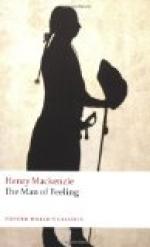This agreeable disappointment, however, he was not long suffered to enjoy. The curate happened that day to dine with him: his visits, indeed, were more properly to the aunt than the nephew; and many of the intelligent ladies in the parish, who, like some very great philosophers, have the happy knack at accounting for everything, gave out that there was a particular attachment between them, which wanted only to be matured by some more years of courtship to end in the tenderest connection. In this conclusion, indeed, supposing the premises to have been true, they were somewhat justified by the known opinion of the lady, who frequently declared herself a friend to the ceremonial of former times, when a lover might have sighed seven years at his mistress’s feet before he was allowed the liberty of kissing her hand. ’Tis true Mrs. Margery was now about her grand climacteric; no matter: that is just the age when we expect to grow younger. But I verily believe there was nothing in the report; the curate’s connection was only that of a genealogist; for in that character he was no way inferior to Mrs. Margery herself. He dealt also in the present times; for he was a politician and a news-monger.
He had hardly said grace after dinner, when he told Mrs. Margery that she might soon expect a pair of white gloves, as Sir Harry Benson, he was very well informed, was just going to be married to Miss Walton. Harley spilt the wine he was carrying to his mouth: he had time, however, to recollect himself before the curate had finished the different particulars of his intelligence, and summing up all the heroism he was master of, filled a bumper, and drank to Miss Walton. “With all my heart,” said the curate, “the bride that is to be.” Harley would have said bride too; but the word bride stuck in his throat. His confusion, indeed, was manifest; but the curate began to enter on some point of descent with Mrs. Margery, and Harley had very soon after an opportunity of leaving them, while they were deeply engaged in a question, whether the name of some great man in the time of Henry the Seventh was Richard or Humphrey.
He did not see his aunt again till supper; the time between he spent in walking, like some troubled ghost, round the place where his treasure lay. He went as far as a little gate, that led into a copse near Mr. Walton’s house, to which that gentleman had been so obliging as to let him have a key. He had just begun to open it when he saw, on a terrace below, Miss Walton walking with a gentleman in a riding-dress, whom he immediately guessed to be Sir Harry Benson. He stopped of a sudden; his hand shook so much that he could hardly turn the key; he opened the gate, however, and advanced a few paces. The lady’s lap-dog pricked up its ears, and barked; he stopped again —
- “The little dogs and all, Tray, Blanch, and Sweetheart, see they bark at me!”
His resolution failed; he slunk back, and, locking the gate as softly as he could, stood on tiptoe looking over the wall till they were gone. At that instant a shepherd blew his horn: the romantic melancholy of the sound quite overcame him!—it was the very note that wanted to be touched—he sighed! he dropped a tear!—and returned.




